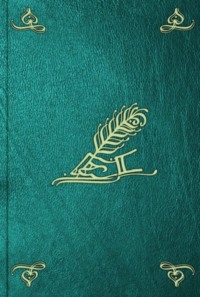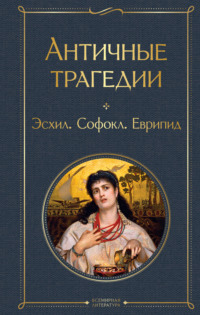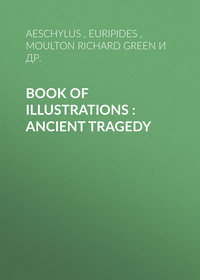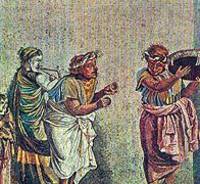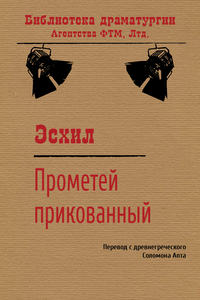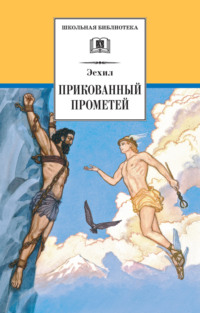 полная версия
полная версияÆschylos Tragedies and Fragments
488
The argument of the Erinnyes is, to some extent, like that of the Antigone of Sophocles (Antig., 909-913), and the wife of Intaphernes (Herod. iii. 119). The tie which binds the husband to the wife is less sacred than that between the mother and the son. This, therefore, brings on the slayer the guilt of blood of kin, while murder in the other case is reduced to simple homicide. Orestes therefore was not justified in perpetrating the greater crime as a retribution for the less. Apollo, in meeting this plea, asserts the sacredness of the marriage bond as standing on the same level as that of consanguinity.
489
The ideal interval of time between the two parts of the drama is left undefined, but it would seem from vv. 230, 274-6, and 429, to have been long enough to have allowed of many wanderings to sacred places, Orestes does not go straight from Delphi to Athens. He appears now, not as before dripping and besmeared with blood, but with hands and garments purified.
490
The story of Adrastos and Crœsos in Herod. i. 35, illustrates the gradual purification of which Orestes speaks. The penitent who has the stain of blood-guiltiness upon him comes to the king, and the king, as his host, performs the lustral rites for him. Here Orestes urges that he has been received at many homes, and gone through many such lustrations. He has been cleansed from the pollution of sin: what he now seeks, to use the terminology of a later system, is a forensic justification.
491
Sc., the scent of blood, which, though no longer visible to the eyes of men, still lingers round him and is perceptible to his pursuers.
492
Here, too, we trace the political bearing of the play. In the year when it was produced (B.C. 458) an alliance with Argos was the favourite measure of the more conservative party at Athens.
493
The names Triton and Tritonis, wherever found in classical geography (Libya, Crete, Thessaly, Bœotia), are always connected with the legend that Athena was born there. Probably both name and legend were carried from Greece to Libya, and then amalgamated with the indigenous local worship of a warlike goddess. Hesiod (iv. 180, 188) connects the Libyan lake with the legend of Jason and Argonauts.
494
In the war with the giants fought in the Phlegræan plains (the volcanic district of Campania) Athena had helped her father Zeus by her wise counsel, and was honoured there as keeping in check the destructive Titanic forces which had been so subdued, burying Enkelados, e. g., in Sicily. The “friends” are her Libyan worshippers. The passage is interesting, as showing the extent of Æschylos's acquaintance with the African and Italian coasts of the Mediterranean.
495
The Choral ode here is brought in as an incantation. This weapon is to succeed where others have failed, and this too, the frenzy which seizes the soul in the remembrance of its past transgression, is soothed and banished by Athena.
496
White, as the special colour of festal joy, was not used in the worship of the Erinnyes.
497
Another rendering gives —
“To dim the bright hue of the fresh-shed blood.”
498
The thought which underlies the obscurity of a corrupt passage seems to be that, as they relieve the Gods from the task of being avengers of blood, all that the Gods on their side can legitimately do against them is to render powerless the prayers for vengeance offered by the kindred of the slain. Their very isolation, as Chthonian deities, from the Gods of Olympos should protect them from open conflict. But an alternative rendering of the second line gives, perhaps, a better meaning —
“And by the prayers men offer unto me
Work freedom for the Gods;”
499
Perhaps, “With torch of sunless gloom.”
500
The words contain an allusion to the dispute between Athens and Mitylene in the time of Peisistratos, as to the possession of Sigeion. Athena asserts that it had been given to her by the whole body of Achæans at the time when they had taken Troïa. Comp. Herod. vv. 94, 95. It probably entered into the political purposes of the play to excite the Athenians to a war in this direction, so as to draw them off from the constitutional changes proposed by Pericles and Ephialtes.
501
Here, and throughout the trial, we have to bear in mind the technicalities of Athenian judicial procedure. The prosecutor, in the first instance, tendered to the accused an oath that he was not guilty. This he might accept or refuse. In the latter case, the course of the trial was at least stopped, and judgment might be recorded against him. If he could bring himself to accept it, he was acquitted of the special charge of which he was accused, but he was liable to a prosecution afterwards for that perjury. If, on the other hand, he tendered an oath affirming his guilt to the prosecutor, he placed himself in his hands. Orestes, not being able to deny the fact, will not declare on oath that he is “not guilty,” but neither will he place himself in the power of his accusers. The peculiarities of this use of oaths were: (1) That they were taken by the parties to the suit, not by the witnesses. (2) That if both parties agreed to that mode of decision, the oath was either way decisive. An allusion to the latter practice is found in Heb. vi. 16, and traces of it are found in the law-proceedings of Scotland. If either party refused, the cause had to be tried in the usual way, and witnesses were called.
502
Æschylos seems here to attach himself to the principles of those who were seeking to reform the practice described in the previous note as being at once cumbrous and unjust, throwing its weight into the scale of the least scrupulous conscience, and to urge a simpler, more straightforward trial. The same objection is noticed by Aristotle in his discussion of the subject. (Rhet. i. 15.)
503
Athena offers herself, not as arbitrator or sovereign judge, but as presiding over the court of jurors whom she proceeds to appoint.
504
Ixion appeared in the mythical history of Greece as the prototype of all suppliants for purification. When he had murdered Deioneus, Zeus had had compassion to him, received him as a guest, cleansed him from his guilt. His ingratitude for this service was the special guilt of his attempted outrage upon Hera. The case is mentioned again in v. 687.
505
In heathen, as in Jewish sacrifices, the blood was the very instrument of purification. It was sprinkled or poured upon men, and they became clean. But this could not be done by the criminal himself, nor by any chance person. The service had to be rendered by a friend, who of very love gave himself to this mediatorial work.
506
In the legend related by Pausanias (Corinth., c. 3), Trœzen was the first place where Orestes was thus received, and in his time the descendants of those who had thus helped held periodical feasts in commemoration of it.
507
The course which Athena takes is: (1) to receive Orestes as a settler with the rights which attached to such persons on Athenian soil, not a criminal fugitive to be simply surrendered; (2) to offer to the Erinnyes, as being too important to be put out of court, a fair and open trial; (3) to acknowledge that he and they are equally “blameless,” as far as she is concerned. She has no complaint to make of them.
508
The red blight of vines and wheat was looked on as caused by drops of blood which the Erinnyes had let fall.
509
Stress is laid on the fact that the judges of the Areopagos, in contrast with those of the inferior tribunes of Athens, discharged their duty under the sanction of an oath.
510
Perhaps
“And each from each shall learn, as he predictsHis neighbour's ills, that heShares in the same and harbours them, and speaks,Poor wretch, of cures that fail.”511
At a more advanced period of human thought, Cicero (Orat. pro Roscio, c. 24) could point to the “thoughts that accuse each other,” the horror and remorse of the criminal, as the true Erinnyes, the “assiduæ domesticæque Furiæ.” Æschylos clings to the mythical symbolism as indispensable for the preservation of the truth which it shadowed forth.
512
Once again we have the poet of constitutional conservatism keeping the via media between Peisistratos and Pericles.
513
The Tyrrhenian trumpet, with its bent and twisted tube, retained its proverbial pre-eminence from the days of Æschylos and Sophocles (Aias, 17) to those of Virgil (Æn., viii. 526).
514
The fondness of the Athenians for litigation, and the large share which every citizen took in the administration of justice, would probably make the scene which follows, with all its technicalities, the part of the play into which they would most enter.
515
It was necessary that some one, sitting as President of the Court, should formally open the pleadings, by calling on this side or that to begin. Here Athena takes that office on herself, and calls on the Erinnyes.
516
The technicalities of the Areopagos are still kept up. The three points on which the Erinnyes, as prosecutors, lay stress are: (1) the fact of the murder; (2) the mode; (3) the motive. “Three bouts,” as referring to the rule of the arena, that three struggles for the mastery should be decisive.
517
The pleas put in by the Erinnyes as prosecutors are: (1) That Clytæmnestra had been adequately punished by her death, while Orestes was still alive; and (2) when asked why they had not intervened to bring about that punishment, that the relationship between husband and wife was less close than that between mother and son. They drew, in other words, a distinction between consanguinity and affinity, and upon this the rest of the discussion turns. Orestes, and Apollo as his counsel, on the other hand, meet this with the rejoinder, that there is no blood-relationship between the mother and her offspring.
518
Sc. Their oath to give a verdict according to the evidence must yield to the higher obligation of following the Divine will rather than the letter of the law.
519
To have died in health by the arrows of a woman-warrior might have been borne. To be slain by a wife treacherously in his bath was to endure a far worse outrage.
520
In this new argument, and the answer to it, we may trace, as in the Prometheus and the Agamemnon, the struggles of the questioning intellect against the more startling elements of the popular religious belief. Zeus is worshipped as the supreme Lord, yet His dominion seems founded on might as opposed to goodness, on the unrighteous expulsion of another. Here, in Apollo's answer, there is a glimmer of a possible reconciliation. The old and the new, the sovereignty of Cronos and that of Zeus may be reconciled, and one supreme God be “all in all.”
521
Comp. the thought and language of the Suppliants, v. 93.
522
The last argument is, that the acquittal can be, at the best, partial only, not complete; formal, not real. There would remain for ever the pollution which would exclude Orestes from the Phratria, the clan-brotherhood, by which, as by a sacramental bond, all the members were held together.
523
The question seems to have been one of those which occupied men's minds in their first gropings towards the mysteries of man's physical life, and both popular metaphors and primary impressions were in favour of the hypothesis here maintained. Euripides (Orest., v. 534) puts the same argument into the mouth of Orestes.
524
The story of Athena's birth, full-grown, from the head of Zeus, is next referred to as the leading case bearing on the point at issue.
525
Here, of course, the political interest of the whole drama reached its highest point. What seems comparatively flat to us must, to the thousands who sat as spectators, have been fraught with the most intense excitement, showing itself in shouts of applause, or audible tokens of clamorous dissent. The rivalry of Whigs and Tories over Addison's Cato, the sensation produced in times of Papal aggression by the king's answer to Pandulph in King John, presents analogies which are worth remembering.
526
The story ran that the tribe of women warriors from the Caucasos, or the Thermodon, known by this name, had invaded Attica under Oreithyia, when Theseus was king, to revenge the wrongs he had done them, and to recover her sister Hippolyta. Ares, the God of Thrakians, Skythians, and nearly all the wilder barbaric tribes, was their special deity; and when they occupied the hill which rose over against the Acropolis, they sacrificed to him, and so it gained the name of the Areopagos, or “hill of Ares.”
527
As in the Agamemnon (v. 1010), so here we find the aristocratic conservative poet showing his colours, protesting against the admission to the Archonship, and therefore to the Areopagos, of men of low birth or in undignified employments.
528
The words, like all political clap-trap, are somewhat vague; but, as understood at the time, the “lawless” policy alluded to was that of Pericles and Ephialtes, who sought to deface and to diminish the jurisdiction of the Areopagos, and the “tyrannical,” that which had crushed the independence of Athens under Peisistratos. Between the two was the conservative party, of which Kimon had been the leader.
529
The Skythians may be named simply as representing all barbarous, non-Hellenic races; but they appear, about this time, wild and nomadic as their life was, to have impressed the minds of the Greeks somewhat in the same way as the Germans did the minds of the Romans in the time of Tacitus. Tales floated from travellers' lips of their wisdom and their happiness – of sages like Zamolxis and Aristarchos, who rivalled those of Hellas – of the Hyperborei, in the far north, who enjoyed a perpetual and unequalled blessedness. – Comp. Libation-Pourers, v. 366.
530
Two topics of praise are briefly touched on: (1) the lower, popular courts of justice at Athens might be open to the suspicion of corruption, but no breath of slander had ever tainted the fame of the Areopagos; (2) it met by night, keeping its watch, that the citizens might sleep in peace.
531
The first of the twelve jurymen rises and drops his voting-ballot into one of the urns, and is followed by another at the end of each of the short two-line speeches in the dialogue that follows. The two urns of acquittal and condemnation stand in front of them. The plan of voting with different coloured balls (black and white) in the same urn, was a later usage.
532
Compare note on v. 419.
533
In the legend of Admetos son of Pheres, and king of Pheræ in Thessalia, Apollo is represented as having first given wine to the Destinies, and then persuaded them to allow Admetos, whenever the hour of death should come, to be redeemed from Hades, if father, or mother, or wife were willing to die for him. The self-surrender of his wife, Alkestis, for this purpose, forms the subject of the noblest of the tragedies of Euripides.
534
Partly as setting at nought the power of Erinnyes and the Destinies, partly as giving wine to those whose libations were wineless. – Comp. Sophocles, Œd. Col. v. 100.
535
The practice of the Areopagos is accurately reproduced. When the votes of the judges were equal a casting vote was given in favour of the accused, and was known as that of Athena.
536
Another reading gives —
“By spurting from your throats those venom drops.”
537
The conservative poet enters his protest through the Erinnyes against the innovating spirit that looked with contempt upon the principles of a past age.
538
Cock-fighting took its place among the recognised sports of the Athenians. Once a year there was a public performance in the theatre.
539
The Temple of the Eumenides or Semnæ (“venerable ones”) stood near the Areopagos.
540
Some two or three lines have probably been lost here.
541
Probably an allusion to the silver-mine at Laureion, which about the time formed a large element of the revenues of Athens, and of which a tithe was consecrated to Athena.
542
Reference is made to another local sanctuary, the temple on the Areopagos dedicated to the Olympian Zeus.
543
The figure of Athena, as identical with Victory, and so the tutelary Goddess of Athens, was sculptured with out-spread wings.
544
Cranaos, the son of Kecrops, the mythical founder of Athens.
545
The sanctuaries of the Eumenides were crypt-like chapels, where they were worshipped by the light of lamps or torches.
546
Perhaps, “Children of Night, yourselves all childless left.”


